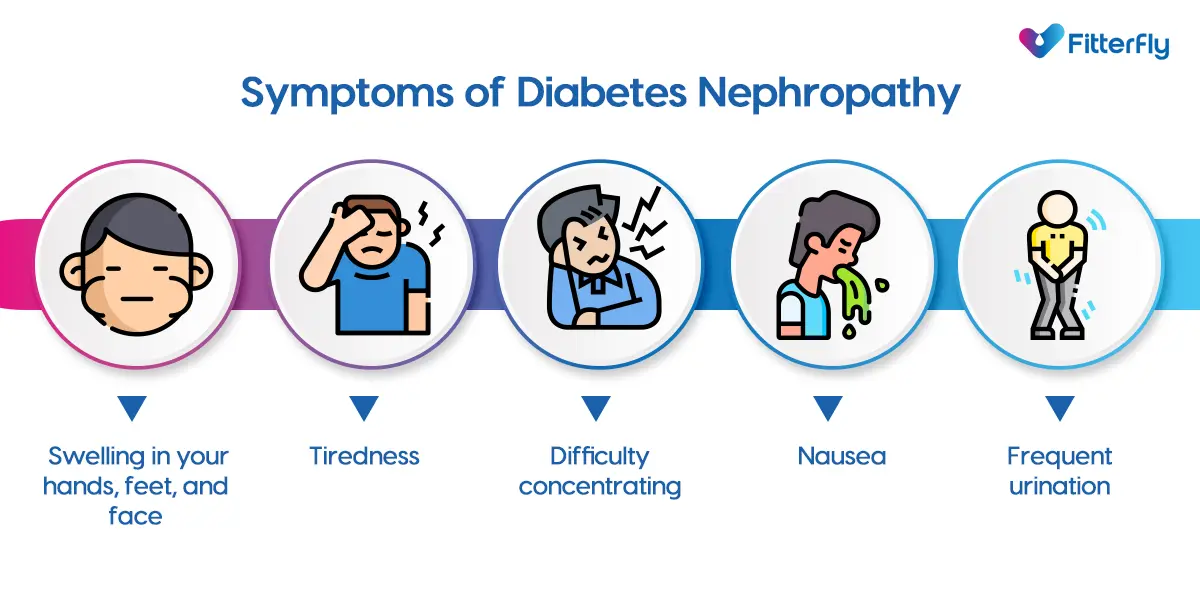What is Diabetes Nephropathy?

Diabetes can affect more than just blood sugar; it can also impact vital organs, including the kidneys. This kidney-related complication, known as diabetic nephropathy, often develops gradually and without noticeable symptoms.
Many people may not realize something is wrong until they start experiencing signs like frequent urination, increased thirst, or swelling in the feet and hands. In the following sections, we’ll take a closer look at what diabetic nephropathy is and how you can manage it effectively.
What is Diabetes Nephropathy?
Diabetes nephropathy, or diabetic kidney disease, is a serious complication that affects the kidneys. It happens when high blood sugar from diabetes slowly damages the blood vessels in your kidneys, making it harder for them to filter waste from your blood.
Over time, this can lead to kidney failure. But don’t panic; catching it early can make a big difference!
How Can Diabetic Nephropathy Be Detected Early?
Early detection is key. Most people don’t realize their kidneys are being affected until it’s too late, which is why regular checkups are so important.
You can catch it early through simple tests, like checking the levels of protein in your urine (albuminuria) and measuring your blood pressure. If these levels start creeping up, it could be a red flag.
To know your chances of Diabetes reversal, take the Diabetes Reversal TestDiabetes Reversal
Calculator
What Causes Kidney Disease in Diabetes?
The main culprit is uncontrolled high blood sugar. Over time, this damages the blood vessels in the kidneys, making it hard for them to do their job. High blood pressure can worsen this damage, which is why managing both your blood sugar and blood pressure is so important.
What Are the Symptoms of Diabetes Nephropathy?

Symptoms usually start showing up in the later stages. These may include swelling in your hands, feet, and face, tiredness, difficulty concentrating, nausea, and an increased need to urinate.
If you notice any of these, please meet your doctor immediately.
What are the Risk Factors of Diabetic Nephropathy?
Several things increase the risk of developing diabetic kidney disease:
- Duration of diabetes: The longer you have diabetes, the higher the risk.
- Poor blood sugar control: Consistently high sugar levels are damaging.
- High blood pressure: This adds strain on the kidneys.
- Smoking: It can double the risk.
- Genetics: A family history of kidney disease can increase your possibility of getting it.
What Are the Stages of Diabetes-Related Nephropathy?
Diabetic nephropathy progresses through different stages depending on the severity of kidney damage. In the early stages, there may be no noticeable symptoms, but as the condition worsens, signs like protein in the urine (which can be found in a urine test) and reduced kidney function become apparent.
Over time, as the damage progresses, more severe symptoms may develop in the advanced stage.
What are the Complications of Diabetic Nephropathy?
Without treatment, diabetic nephropathy can lead to severe complications such as:
- Kidney failure; is when your kidneys stop working and you need dialysis or a transplant.
- Cardiovascular problems, such as damaged kidneys, can affect your heart.
- Fluid buildup, causing swelling and shortness of breath.
| Did You Know?
Keeping your blood pressure under control can slow the progression of kidney damage? |
What Tests Will Be Done to Diagnose Diabetes-Related Nephropathy?
Your doctor will do/ask for a few simple tests to check for kidney damage:
- Urine test: This checks for protein (albumin) levels.
- Blood test: To measure creatinine levels, which show how well your kidneys are filtering waste.
- Imaging tests: Sometimes, doctors may use an ultrasound to get a better look at the kidneys.
How Is Diabetes Nephropathy Treated?
If you are diagnosed with diabetic nephropathy, you need to see a specialist doctor – specifically a nephrologist, along with seeking expert consultation. Based on your condition and medical reports, your doctor will recommend appropriate treatment options, including prescribed medications.
Do take your medications as directed, without missing any doses, as this will help manage your condition effectively. Along with medications, your doctor may also suggest lifestyle changes.
Reduced HbA1c by HALF in 6 months


6.6%
Happy members
EMI
Guarantee
4.8/5
Diabetes Prime Program
How Can You Prevent Diabetes Nephropathy?
Here are a few lifestyle changes you can adopt to help delay the progression of nephropathy:
1. Eat a kidney-friendly diet
Focus on a diet that’s low in salt and processed foods while being rich in fruits and vegetables. Limiting protein intake, particularly from red meat, can also reduce the strain on your kidneys. Try incorporating more plant-based proteins, like lentils or chickpeas.
2. Stay active
Regular physical activity can help you maintain a healthy weight and improve your blood sugar levels. Even something as simple as walking daily can make a big difference.
3. Quit smoking
Smoking speeds up kidney damage, so if you smoke, quitting is one of the most effective ways to protect your kidneys. It also helps with blood pressure control, which is essential for slowing kidney disease.
4. Limit alcohol
Too much alcohol can raise your blood pressure and make it harder to manage your blood sugar. Keeping it to a minimum can improve overall health.
5. Manage stress
Chronic stress can affect your blood pressure and sugar levels, so finding ways to relax, whether it’s through yoga, meditation, or just taking time out for yourself, can be really beneficial.
6. Blood pressure management
Medications like ACE inhibitors not only lower your blood pressure but also help protect the kidneys from further damage.
7. Blood sugar control
Keeping your blood sugar levels in check, through either oral medications or insulin, is crucial in preventing further kidney damage.
8. Medication for cholesterol
High cholesterol can also worsen kidney disease, so your doctor may prescribe statins to help manage it.
In many cases, combining these lifestyle changes with the right medications can slow down or even stop the progression of diabetic nephropathy. It’s about finding the right balance that works for you! We can help you with this.
When to See a Doctor?
Early detection is key! If you have diabetes, it’s important to not only manage your blood sugar but also monitor your kidney (renal) function through regular check-ups with your doctor.
Along with routine diabetes care, you should have at least one comprehensive check-up per year and complete all the necessary tests to keep track of your overall health. This proactive approach can help catch any potential issues early and prevent complications.
How We At Fitterfly Can Help You?
If diagnosed with diabetic nephropathy, see a nephrologist and follow their treatment plan. Take medications as prescribed and consider any recommended lifestyle changes.
It is best to manage your lifestyle early to delay or avoid diabetes-related complications like diabetic nephropathy. This is where Fitterfly can make all the difference.
We provide the right support by offering access to a team of experts: a nutrition coach helps you choose kidney-friendly foods that are low in salt, a fitness coach creates a simple exercise plan to keep your blood sugar in check, and a mental wellness coach guides you through stress management to help you stay calm and balanced. With Fitterfly, all the support you need is in one place, making it easier to manage your health.
You can reach out to us on 08068507599, also check out our Diabetes Prime Program for more information.
This blog provides general information for educational and informational purposes only and shouldn't be seen as professional advice.
Frequently Asked Questions
What are the 5 stages of diabetic nephropathy?
Diabetic nephropathy progresses through five distinct stages, each indicating increasing levels of kidney damage. In Stage 1, the kidneys are still functioning normally, but there is an abnormal amount of protein in the urine, which can be an early warning sign. Stage 2 involves mild kidney damage, although the kidneys are still capable of functioning adequately. By Stage 3, there is a moderate loss of kidney function, which can begin to affect overall health. Stage 4 is marked by a severe reduction in kidney function, and medical intervention becomes crucial. Finally, Stage 5 is considered kidney failure, also known as end-stage kidney disease, where the kidneys can no longer function on their own, making dialysis or a kidney transplant necessary to sustain life.
What foods help repair kidneys with diabetes?
For people with diabetes, it’s important to eat kidney-friendly foods that are low in phosphorus, sodium, and protein. In India, some common high-phosphorus foods to limit include dairy products like paneer, milk, and cheese; processed meats like sausages; legumes such as chana (chickpeas) and rajma (kidney beans); nuts like cashews and almonds; and seafood like dried fish. Sugary drinks, alcohol, and sodas should also be avoided. Instead, focus on foods like white rice, lauki (bottle gourd), tinda (Indian squash), and fruits like apples and guavas, which are lower in phosphorus and easier on the kidneys. Reducing portion sizes of protein-rich foods can also help protect the kidneys.
How to control diabetic nephropathy?
To control diabetic nephropathy, it's important to manage blood sugar and blood pressure levels, adopt a kidney-friendly diet, stay physically active, quit smoking, and limit alcohol intake. Taking your medications prescribed in a timely manner can also protect the kidneys. Regular check-ups and early intervention are key to slowing the progression of the disease.
Is diabetic nephropathy reversible?
Diabetic nephropathy is not usually reversible, especially in later stages. However, early detection and proactive management, including blood sugar control, lifestyle changes, and medication, can slow its progression and improve outcomes.
What is a normal creatinine level for diabetes?
Creatinine levels vary, but for adults with diabetes, a normal range is typically around 0.6 to 1.1 mg/dL (measured by the enzymatic method). Higher levels may indicate kidney damage or impaired function, so regular monitoring is essential.




















